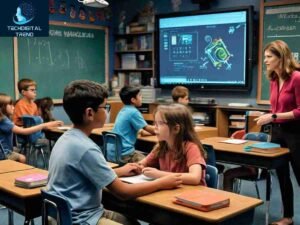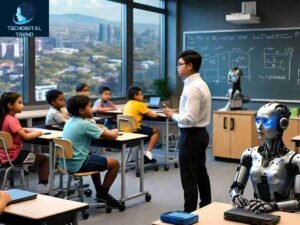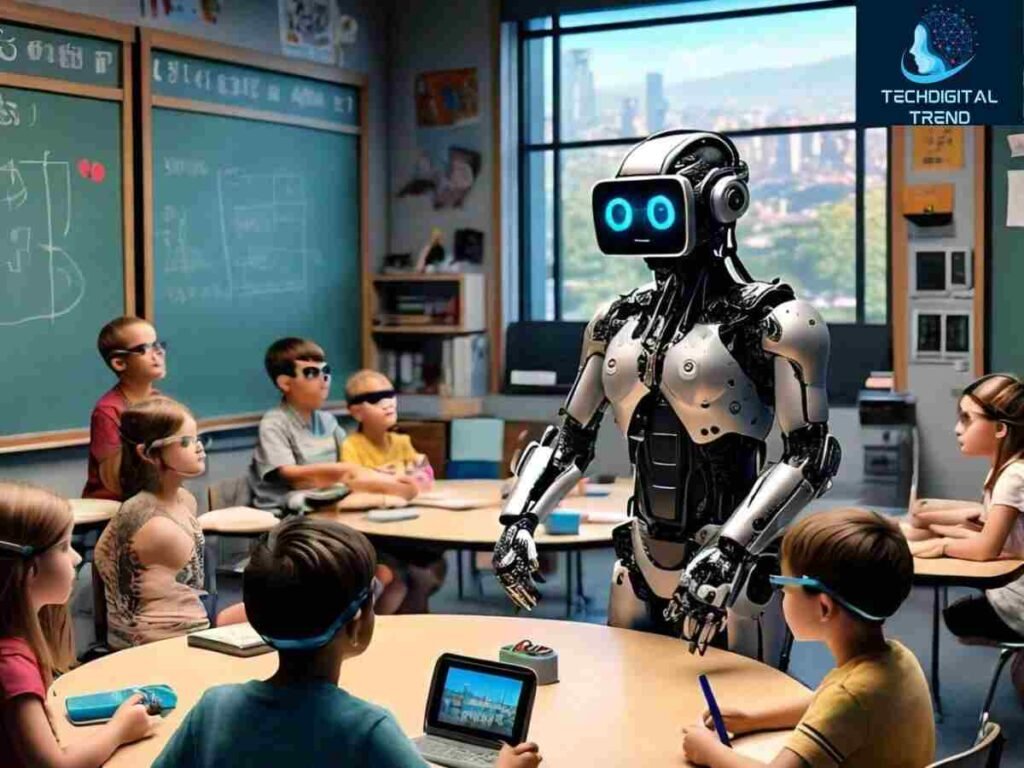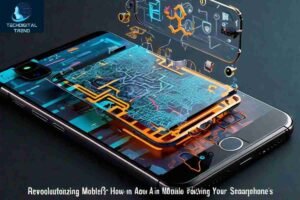Table of Contents
ToggleAI and Education
Numerous facets of our life have changed due to artificial intelligence , AI and education is no exception. The integration of AI and education has brought about a paradigm shift in the way we learn, teach, and interact with each other. In this blog, we will explore the impact of AI on education and how it is revolutionizing the learning
experience.
AI has been gradually making its way into the education sector over the past few years. From intelligent tutoring systems to personalized learning platforms, AI-powered tools are being increasingly used to enhance the learning experience. According to Markets and Markets, the AI in education market is expected to grow from $1.1 billion in 2020 to $12.4 billion by 2025, at a Compound Annual Growth Rate (CAGR) of 45.8% during the forecast period.
Benefits of AI in Educationized Learning
- AI-powered adaptive learning systems can adjust the difficulty level of course materials based on a student’s performance, providing a personalized learning experience. This approach ensures that each student learns at their own pace, and the content is tailored to their individual needs.
2. Intelligent Tutoring Systems
- AI-powered intelligent tutoring systems (ITS) offer one-on-one support to students, providing real-time feedback and guidance. ITS can identify knowledge gaps and offer targeted interventions, helping students to improve their understanding of complex concepts.
3. Automated Grading
- AI-powered grading systems can accurately assess student performance, freeing up instructors to focus on more important tasks. Automated grading also helps to reduce bias and errors, ensuring that students receive fair and objective feedback called AI and Education.
4. Enhanced Accessibility
- AI-powered tools can help students with disabilities, such as visual or hearing impairments, to access educational content more easily. For example, AI-powered speech-to-text systems can help students with dyslexia to read and write more effectively.

5. Natural Language Processing
- AI-powered natural language processing (NLP) can help students to improve their language skills, such as reading comprehension and writing abilities. NLP can also help instructors to identify areas where students may need additional support.
6. Virtual Learning Environments
- AI-powered virtual learning environments (VLEs) can provide immersive and interactive learning experiences, simulating real-world environments and making learning more engaging and fun.
7. Career Guidance
- AI-powered career guidance systems can help students to identify their strengths and interests, providing personalized career recommendations and guidance.
8. Continual Learning
- AI-powered continual learning platforms can help adults to upskill and reskill, providing flexible and personalized learning pathways that meet the demands of a rapidly changing workforce.
Challenges and Concerns
1. Job Displacement
- The increasing use of AI in education has raised concerns about job displacement. There is a fear that AI-powered tools could replace human instructors, leading to unemployment and a loss of personal touch in the learning experience.
2. Bias and Discrimination
- AI systems can perpetuate existing biases and discrimination if they are trained on biased data. This can lead to unfair outcomes and a widening of the achievement gap between different student groups called AI and Education.
3. Ethical Considerations
- The use of AI in education raises ethical concerns, such as privacy and data security. There is a need for clear guidelines and regulations to ensure that student data is protected and used responsibly.
4. Dependence on Technology
- Over-reliance on AI-powered tools can lead to a lack of critical thinking and problem-solving skills among students called AI and Education.
5. Digital Divide
- The unequal distribution of technology and internet access can exacerbate existing inequalities in education, making it difficult for some students to access AI-powered tools and resources.
The Future of AI in Education
- The future of AI and education is exciting and full of possibilities. As AI technology continues to evolve, we can expect to see even more innovative applications in the education sector. Some potential developments include.

1. AI-Powered Mentorship
- AI-powered mentorship programs could provide students with personalized guidance and support, helping them to navigate their academic and professional careers.
2. AI-Driven Research
- AI-powered research tools could help students to conduct research more efficiently and effectively, providing insights and patterns that may not be visible to the human eye called AI and Education.
3. AI-Based Assessment
- AI-powered assessment tools could help instructors to evaluate student performance more accurately and objectively, providing instant feedback and guidance.
Conclusion
AI is transforming the education sector in profound ways, offering numerous benefits and opportunities for growth. However, it also raises important challenges and concerns that must be addressed. As we move forward in this age of machines, it is essential that we prioritize responsible AI development, ensuring that these technologies.
Open this link: tap to here














